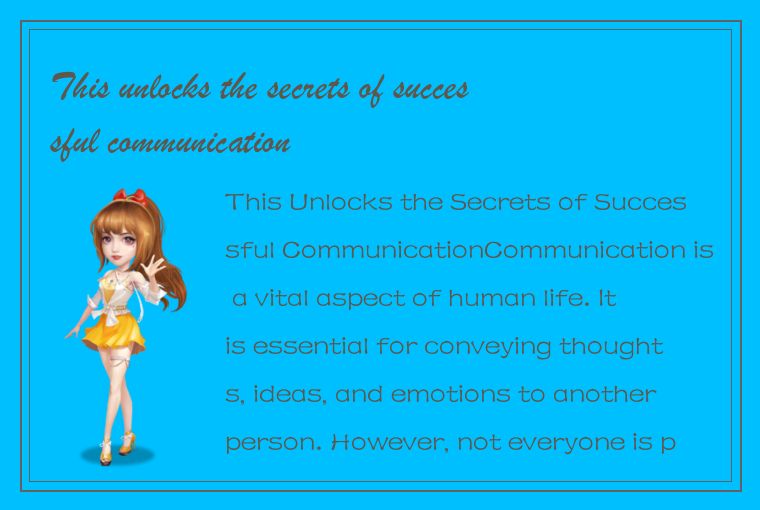This Unlocks the Secrets of Successful Communication

Communication is a vital aspect of human life. It is essential for conveying thoughts, ideas, and emotions to another person. However, not everyone is proficient in communication. Some people find it challenging to express themselves, while others struggle to comprehend what others are saying. This is where "this" comes in - the key to unlocking the secrets of successful communication.
What is "This"?
"This" refers to the art of active listening. Active listening involves paying attention to what another person is saying, understanding their perspective, and responding appropriately. It is a crucial element of effective communication and can significantly impact the outcome of a conversation.
Many people tend to focus on what they are going to say next instead of listening to the speaker. They interrupt, change the subject, or simply ignore what the other person is saying. This can lead to misunderstandings, conflicts, and a breakdown in communication.
Active listening, on the other hand, enables the listener to actively engage in the conversation, not just respond with pre-set answers. It helps to establish a rapport with the speaker, understand their needs and emotions, and provide a thoughtful response.
The Benefits of Active Listening
Active listening has numerous benefits that can positively impact personal and professional relationships. Here are some of the key advantages of active listening:
1. Improved Communication: Active listening helps to establish clear communication between people. It promotes understanding, clarifies any misunderstandings, and creates trust between the listener and the speaker.
2. Building Stronger Relationships: People who listen actively tend to build stronger and more meaningful relationships with others. Active listening shows that you respect and care about the other person's feelings and opinions, which can help to create deeper bonds.
3. Enhanced Problem Solving: Active listening can help to solve problems more effectively. By understanding the speaker's point of view, you can identify the root cause of the issue and work together to find a resolution.
4. Increased Empathy: Empathy is the ability to understand and share the feelings of another person. Active listening helps to develop empathy by enabling you to see things from the speaker's perspective, which helps to create a more compassionate and understanding response.
Tips for Effective Active Listening
While active listening may seem straightforward, it can be challenging to implement in practice. Here are some tips to help you master the art of active listening:
1. Pay Attention: Focus on the speaker and avoid distractions like your phone or other forms of multitasking.
2. Provide Feedback: Use body language like nodding or maintain eye contact to show you're engaged. You can also provide verbal feedback by summarizing or clarifying what the speaker has said.
3. Show Empathy: Put yourself in the speaker's shoes and try to understand their point of view.
4. Avoid Interrupting: Don't interrupt or cut off the speaker. Allow them to complete their thoughts before responding.
5. Don't Make Assumptions: Avoid making assumptions about what the speaker is saying. Instead, ask for clarification to ensure you understand their message.
In conclusion, active listening is the key to unlocking the secrets of successful communication. By practicing active listening, you can establish better communication, build stronger relationships, enhance problem-solving skills, and increase empathy. So, the next time you find yourself in a conversation, remember to listen actively - it just might change the outcome of the conversation for the better.




 QQ客服专员
QQ客服专员 电话客服专员
电话客服专员